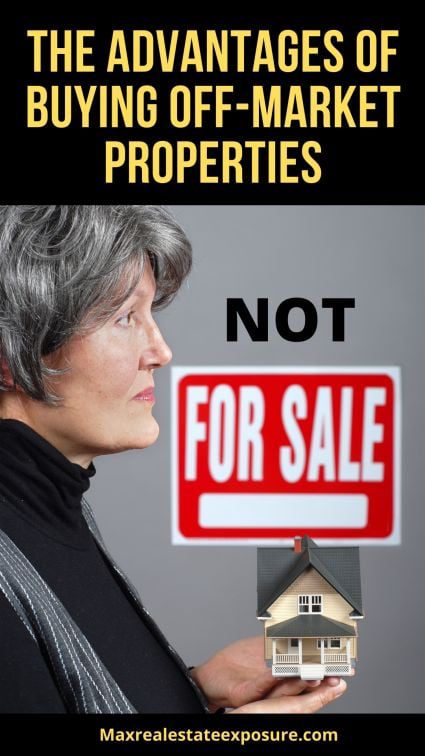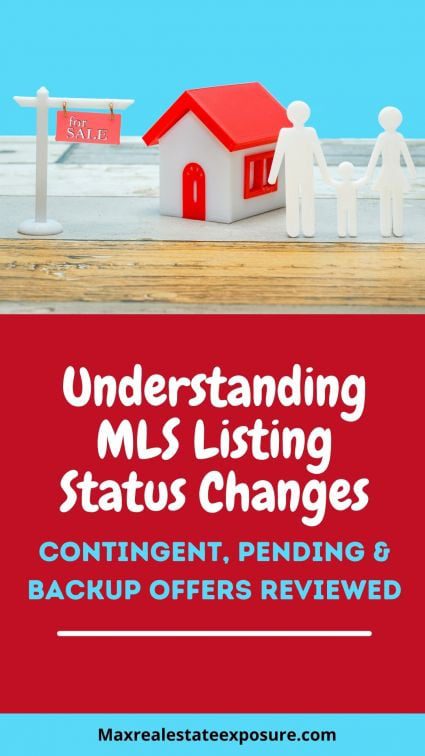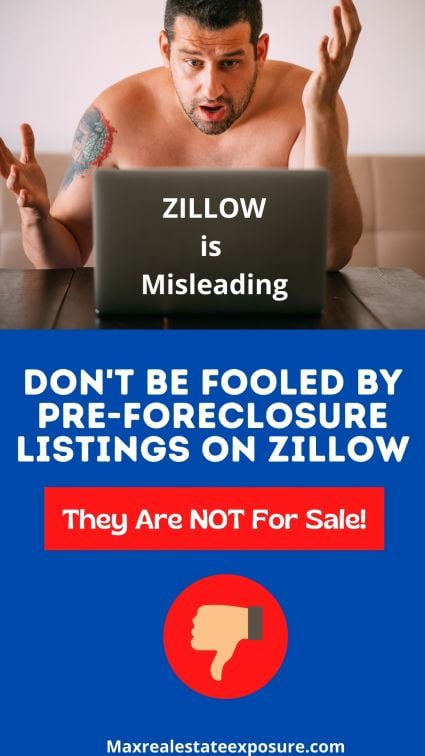Everything to Know About Off-Market Properties
 Are you ready to learn all there is to know about off-market properties?
Are you ready to learn all there is to know about off-market properties?
You probably want to know what an off-market property is and how to find them.
Key things you’ll learn about:
- What are off-market properties?
- How to find off-market homes.
- Understanding real estate listing status terminology.
- Misleading pre-foreclosure off-market listings explained.
- Benefits of off-market properties.
When searching for a new home to buy, you might have seen some properties described as “off-market” and wondered what that means.
Off-market properties could be particularly enticing in competitive, low-inventory real estate markets.
Due to low inventory, completing a real estate transaction has been far more challenging over the last few years.
Finding homes that are not in the MLS could be a good option.
But how do you find off-market homes for sale? Let’s examine what these properties are and how to find them.
The Two Meanings of Off-Market Properties
Confusingly, the term off of the market can have two different meanings.
Off-market can either mean that it is not currently for sale or is for sale but not listed on the multiple listing service.
If you have found a property labeled this way when looking through listings online, off-market means the property isn’t currently on the market.
The home is off the market, and you can’t make an offer for it. This situation might change if the owner decides to sell their property. But for now, you’ll have to continue your search.
However, if you have heard an investor talking about off-market properties, it means something else. In that case, it means homes that haven’t been listed in the Multiple Listing Service database.
The MLS database is where real estate agents list properties for sale.
The homes that aren’t listed in the MLS, but are still for sale, are sometimes known as pocket listings. They are also called “quiet” or “silent” listings because few people know about them.
If you find a home that you want to buy, that is one of these pocket listings; you may have the opportunity to buy a property below what it is worth.
Pocket Listings Are Great For Buyers But Not For Most Sellers
Pocket listings typically do not benefit home sellers financially because the property is not being marketed to the masses. Instead, a select few people will be aware that the house is for sale.
While this might seem like a great way to save money on your next home, things are rarely that easy. There are some potential downsides to buying this type of property, which we’ll explain further.
Let’s take an in-depth look at what is an off-market listing.
What is an Off-Market Listing?
An off-market for sale means it will sell without being publicly listed on the open market in real estate. The seller might only market it to a small group of investors, or they might offer it directly to a buyer.
Either way, it won’t be advertised as homes usually would be.
In other words, off-market properties are not listed in the multiple listing service (MLS). MLS listings dramatically increase exposure for home sellers.
Homes are sold off-market more often than most people would expect. Since this is effectively done out of sight, buyers might be surprised to learn that around 10% of homes are sold this way.
How frequently this happens depends on the region and if the housing market is hot. Buying a home off-market can benefit a home buyer because there is less competition from other buyers.
Off-Market Properties Are Better For Buyers
Off the market, properties can be desirable to buyers when the market favors home sellers, mainly when numerous bidding wars occur.
Searching property owners in public records for off-market deals is not unheard of in a hot market. Real estate investors will often seek unconventional methods for real estate properties to purchase.
Sometimes there isn’t a market property worthy of purchase. A lack of real estate listings is often the cause.
Quite often, better deals can be found this way. There is no reason you can’t do the same, along with other methods of finding off-market sales. You don’t need to search for an investment property for it to be worthwhile.
Buying homes not for sale has become more common today.
When it comes to homes not listed in the MLS, Realtors need to follow the rules mandated by NAR.Click To TweetRealtors Must Follow Rules With Off Market Properties
In 2019, the National Association of Realtors created a rule regulating off-market properties listed in MLS. It is called the MLS Statement 8.0 Clear Cooperation Policy and went into effect in 2020.
The new rule requires Realtors to submit listings to the MLS within one day of marketing the property for sale to the public.
Marketing includes selling it on various real estate websites, flyers, mailings, yard signs, and other communication methods.
The cooperation rule was put into place to increase participation among Realtors. Real Estate brokers can still create off-market listings with seller privacy or an office-exclusive listing.
It should be noted that there is a difference between being a Realtor and a real estate agent. The National Association of Realtors does not govern real estate agents, just association members.
Market transactions typically foster an environment that is much better for sellers. A market sale dramatically enhances the odds of more buyers vying for a property. Potential sellers are best served by making their homes available to as many home buyers as possible.
Exclusive listings don’t provide maximum exposure, so it is a good idea for home sellers not to market in this fashion.
The Advantages of Buying Off-Market Properties
 There are some advantages to buying a home that isn’t listed in the MLS, typically when you are a buyer.
There are some advantages to buying a home that isn’t listed in the MLS, typically when you are a buyer.
Understanding how to find off-market properties will be necessary, which will be covered later.
Increasing Your Chances of Finding a Home
If you find homes for sale that haven’t been listed in the MLS, you’ll have the chance to bid on homes that not many others will have seen.
It could mean that there are only a couple of other potential buyers, significantly increasing your chances of success.
You’ll likely pay less for the home when you are not involved in a bidding war.
Take Your Time With Off-Market Houses
Since there is less competition and the seller is less likely to be in a rush to find a buyer, you have more time.
Having no time constraints means you’ll be less rushed when looking at the property and deciding if it’s what you want.
Easier Negotiations When Not Officially For Sale
Thanks to less pressure, negotiation can be more relaxed. This can lead to sellers being more flexible and a more effortless property transaction overall.
Typically, in these types of situations, buyers have the advantage. Since off-market homes are often distressed sales, the homeowner is more willing to make concessions or even a financial seller’s assistance. The situation can give buyers far better contracts than expected under normal circumstances.
Why are Homes Listed as Off The Market?
While not being listed is the off-the-market meaning, there are many reasons a seller might choose to do this. The most common reason for this is the seller not wanting their home sale to be public.
There could be many reasons a seller might not want their home sale publicized. Perhaps they are in financial difficulty and don’t want people they know to find out. Sometimes, people go through a divorce and don’t want to publicize their situation.
If the property is a rental and they don’t want their tenant to find out the home is for sale, they might also choose this option.
Maybe they don’t like the idea of strangers and their neighbors wandering around their homes, especially with open houses. These are all common reasons a seller may want a private listing.
Sometimes sellers choose to generate some interest in their sale by initially listing it off-market. Instead, the home might be marketed as coming soon.
Off-market can be used to test the reaction from prospective buyers. This can change the price before it finds its way into the MLS. This way, the seller gets to avoid reducing the price after it has been listed and the negativity that could bring to their listing.
It’s the easiest way of getting some instant feedback.
It can also prevent the home from sitting on the market without being sold. Long days on the market could leave buyers questioning if there is a problem.
It can happen with higher-value properties that will inevitably take longer to sell even if the market is strong.
Understanding Real Estate Listing Status Terminology
 It isn’t only “off-market” that could confuse you in the listings. For the layperson, other terms like “contingent” and “pending” can be hard to understand.
It isn’t only “off-market” that could confuse you in the listings. For the layperson, other terms like “contingent” and “pending” can be hard to understand.
These two listing statuses mean that a home is off the market because a contract to purchase has been executed by both a buyer and seller.
To be able to purchase one of these properties, the sale would need to fall through.
What is a Contingent Listing?
Contingent listings remain active because there is a chance that the clauses in the contract won’t be met.
If that happens, the seller will be looking for another buyer. But the chances are that the contingent deal will proceed to close.
Take a look at the reference for an in-depth explanation of the meaning of contingent status. Quite often, a contingent property will still appear as an active listing.
Some MLS systems refer to this as active contingent status.
What is a Pending Listing?
Pending is the stage after contingent when the seller has accepted the offer and the contingencies in the contract have been met.
Since there isn’t much stopping the sale from closing once the contingencies have been completed, pending listings aren’t considered active.
Pending typically means off-market or not available to purchase. You can see a comprehensive explanation of what pending means in this resource.
In some areas of the country, the listing agent can choose the status they feel is in the owner’s best interest.
What Does a Backup Offer Mean?
You may lose out to another buyer while actively searching for your dream home. Maybe the timing wasn’t perfect, or you were outbid.
If you still want to purchase the property, you can put in what’s referred to as a backup offer.
With a backup offer, you will be in the first position to purchase the home if the contract with the first buyer falls through. Homes sales falling apart is not uncommon.
For example, a home inspection could reveal problems a potential buyer does not want to deal with.
The main reason a home sale will fall apart is inspection reports filled with unexpected issues.
A buyer may also not procure financing for many reasons, including a low real estate appraisal or credit scoring issues that did not turn up.
What Does Off Market Mean on Realtor.com and Zillow?
When you see properties on the popular real estate portals Zillow and Realtor marked as “off-market,” it means they are not listed for sale. Sometimes mistakes are made on websites, or the information has not been updated yet.
It is always worth speaking with a real estate agent to double-check if you suspect a home is for sale.
Don’t Be Fooled By Pre-foreclosure Listings on Zillow
 The popular real estate search site Zillow has a misleading feature called pre-foreclosure listings. The pre-foreclosure listings cause confusion and frustration among real estate agents and consumers alike.
The popular real estate search site Zillow has a misleading feature called pre-foreclosure listings. The pre-foreclosure listings cause confusion and frustration among real estate agents and consumers alike.
Zillow publishes properties through a partnership with Realty Trac for homeowners who have missed a mortgage payment.
Of course, missing a mortgage payment in no way means someone wants to sell their property.
More than likely, it means they have hit a financial bump in the road.
Unfortunately, Zillow makes it look like these homes with missed mortgage properties are listed for sale. They are NOT!
In the truest sense of the word, they are off-market properties that will likely never be for sale.
Most of the time, the homeowner becomes current, and the property does not become a foreclosure home you can purchase. They usually don’t become a short sale either.
There are numerous times clients will call me about houses they think are for sale seen on Zillow that are not on the market.
Recently one of my clients called on a house in Westborough, Massachusetts, that was not for sale.
It can be super frustrating for real estate agents and consumers alike.
The Pros and Cons of Buying Off-Market Properties
While buying a home off-market could mean you get a far better deal than you could hope for, it isn’t without its risks. This type of home purchase is only really suitable for investors with a lot of experience rather than people new to home buying.
The Pros of Off-Market Properties
If you want to find a home with a potentially significant discount over a standard listing, buying off-market could be the answer.
Sellers choosing this option aren’t doing it because they expect to get the best home price. Instead, they have more significant concerns. However, potential buyers can use this to get a home for less than its actual market value.
There are many advantages to having no competition when you buy. It should make the home purchase less stressful and rushed, as well as reduce the likelihood that you will get into a bidding war, as previously mentioned.
Adding off-market listings to your property search will also increase your chances of finding the right property.
The Cons of Off-Market Properties
Though you could find a significant discount on the home’s value, the off-market listing doesn’t guarantee a good deal.
On top of that, finding these types of homes is more complicated. It takes a lot more work, and it isn’t entirely sure it will work out for the better.
For the buyers of these homes, it might be more challenging to determine the fair market value. With these types of purchases, buyers need to be more careful and do more research.
Getting an accurate value requires the buyer to do a comparative market analysis and find appropriate real estate comps to find the property’s current value.
This could be challenging if you are not working with a real estate agent. You might need to hire an appraiser to help establish the value, especially if the home has unique characteristics.
It isn’t always free to find off-market properties either. You could find that there are upfront fees for membership to non-MLS providers. Costs could be much more than expected when trying to get a good deal on a new home.
How to Find Off-Market Properties?
 Knowing how to find off-market properties will be critical if you want success. There will be off-market homes for sale, and you need to know how to locate them.
Knowing how to find off-market properties will be critical if you want success. There will be off-market homes for sale, and you need to know how to locate them.
If you contact local real estate agents, you might get lucky and find they have access to pocket listings. However, not all agents will have a good selection of off-market homes for sale.
More experienced Realtors might be better able to guide you to a range of non-MLS listed homes.
Another option is to look for pocket listing services that market homes privately.
You could discover other off-MLS sources and real estate auction websites in your journey to find homes not listed on the MLS.
It’s possible to get a great deal if you find a good source of off-market homes and see one that meets your requirements.
You need to be more cautious and do more research, but it will be worth the extra work if it pays off.
Methods of Finding Off-Market Homes For Sale
Finding off-market homes for sale can be challenging.
If you want to be aggressive in finding potential off-market properties for sale, there are several ways.
Here are a few methods:
- Go to Roofstock. They are a company that has exclusive off-market homes for sale.
- Send out mailings to particular houses you are interested in through direct mail marketing.
- Networking with friends and relatives to see if they know anyone considering selling.
- Speaking to real estate agents to let them know what you’re looking for with off-market properties.
- Knocking on doors if you want to be aggressive.
- Hire a buyer’s agent to seek out an off-market home to purchase.
- Word of mouth to the general public.
- Blasting your desire to purchase a home on social media.
- Looking at Zillow – the website allows sellers to list their homes 30 days before they will be officially listed for sale.
- Speak to real estate wholesalers. Investors
- Real Estate auctions can be a good source of selling off-market homes.
Off-Market Properties Near Me
A Google search is perhaps one of the better ways of finding off-market properties. Do an online search for off-market properties near me or off-market homes for sale near me.
It also could be worth trying off-market homes for sale by the owner. You may get lucky and see some for sale by owner properties.
Is it a Good Idea to Sell Off The Market?
When you want to maximize the sale price of your home, selling off-market is not a good idea. On the other hand, selling without listing publicly could be acceptable if you need privacy.
Final Thoughts on Off-Market Properties
When you desperately try to find a home for yourself or your family, looking for off-market properties is worth trying. Just be extra careful with these properties, especially when no real estate agents are involved.
It will be advisable to have a real estate attorney in your corner to ensure everything goes smoothly and the closing process on the house is not derailed for some reason.
Always do plenty of due diligence before proceeding with the purchase.
Hopefully, you have found this off-market real estate guide useful.
About the author: The above Real Estate information on off-market properties was provided by Bill Gassett, a Nationally recognized leader in his field. Bill can be reached via email at billgassett@remaxexec.com or by phone at 508-625-0191. Bill has helped people move in and out of many Metrowest towns for the last 37+ years.
Are you thinking of selling your home? I am passionate about real estate and love sharing my marketing expertise!
I service Real Estate Sales in the following Metrowest MA towns: Ashland, Bellingham, Douglas, Framingham, Franklin, Grafton, Holliston, Hopkinton, Hopedale, Medway, Mendon, Milford, Millbury, Millville, Natick, Northborough, Northbridge, Shrewsbury, Southborough, Sutton, Wayland, Westborough, Whitinsville, Worcester, Upton, and Uxbridge MA.

